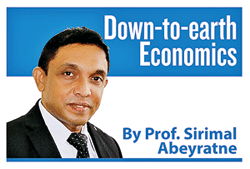Transformation of a crippled economy
View(s):In an interview with me too, I was asked about my opinion about the Economic Transformation Bill. In response, I also wanted to ask for a clarification before answering it: “Is it an economic question or a political question?”
Today, I thought of briefing about the contents of the Bill and its importance with respect to the expected transformation of the crippled economy of the country.

Tourists play on the beach. Tourism is one industry that can garner much needed foreign exchange.
Crippled economy
We must begin with the economic status of our crisis-ridden economy of the country, although economic matters do not attract much attention in the present political arena. What the people of this country have been experiencing is a “man-made” economic crisis. It has developed over the years due to “policy errors”. Crises develop slowly, but the collapse is sudden. In Sri Lanka too, it developed over the past 2 – 3 decades, as these developments were continuously overlooked at policy-making.
It is amazing for me to see that after 46 years of policy reforms in 1977, Sri Lanka has been able to achieve only US$ 12 billion export earnings, as of 2023. It is just the export income of a single company in some of our neighbouring countries, which count their total export earnings in terms of 300-500 billion dollars. For instance, last year Malaysia earned $352 billion, Singapore 515 billion, Thailand 287 billion, Vietnam 370 billion, and India 437 billion.
Complementing the dismal export performance particularly during the past 25 years, government spending hit the roof, while people also received their share of it in numerous ways: government jobs and salary hikes, subsidised utilities and services below the cost, maintenance of under-performing 100s of state-owned enterprises, and credit-financed public investment. The spending gap was filled with foreign borrowings and money-printing.
Possible future crises
In the absence of adequate foreign exchange earnings, it was increasingly difficult to convert rupees into dollars in order to meet rising foreign debt obligations. At the time of collapse, about half of the export earnings were needed to pay off annual foreign debt instalment.
 In addition, about twice the foreign exchange earnings were also needed to finance imports. It was sustained years and decades with further borrowings. And finally, at the end “bankruptcy” was declared about two years ago, making the matters worse than they were before.
In addition, about twice the foreign exchange earnings were also needed to finance imports. It was sustained years and decades with further borrowings. And finally, at the end “bankruptcy” was declared about two years ago, making the matters worse than they were before.
Negative growth rates have wiped out about 8 – 10 years of wealth creation, while “hyperinflation” has eroded more than half of the people’s real incomes. The crisis has pushed down about one-third of the population into poverty and increased the vulnerability risk of the non-poor people.
The economy has just turned around as reflected by the recent macroeconomic indicators, but the recovery may take couple of years more. However, uncertainty in the fragile economy and the risk of falling back continue to remain during the recovery process. And the country needs “economic progress” beyond recovery in order to avoid future crises and to sustain development.
Unveiled growth path
It is in this backdrop that we must dig into the content and the relevance of the Economic Transformation Bill. It has attempted to provide a national policy for economic transformation by modernising the regulatory and institutional framework and considering the current global economic dynamics including technological advancement and environmental challenges.
While setting the objective of achieving economic development and raising living standards of the people, the Bill categorically mentions the object of avoiding a future economic crisis. In order to ensure the achievement of stated economic objectives, the Bill specifies quantified targets to be reached in the medium term. These ambitious targets include the following: Given the public debt issue in the heart of Sri Lanka’s economic crisis, the Bill targets easing of the debt burden within the next eight years. It expects to reduce public debt to below 95 per cent of GDP and foreign debt service to 4.5 per cent of GDP by 2032. At the same time the government’s gross financing need which is new borrowing requirements plus the maturing debt payments, is also expected to be below 13 per cent of GDP.
Ease of debt burden within a given time frame cannot be achieved without economic growth and export expansion. The Bill targets 5 per cent rate of GDP growth by 2027 and sustain it above that level thereafter. Growth should emanate primarily from the “tradable sectors” so that export expansion is fundamental to achieving higher growth and sustaining it in the long-run.
Exports and FDI
Export expansion is targeted to be 25 per cent of GDP by 2025, 40 per cent by 2030, and 60 per cent by 2040. Exports were 20 per cent of GDP in 2023, which had declined from 39 per cent of GDP since 2000. As Sri Lanka has now been recognised as an inward-oriented economy, the Bill acknowledged that higher export growth is necessary to transform it again to an export-oriented economy.
Export expansion cannot be increased, unless Sri Lanka makes itself attractive to foreign direct investment (FDI). Rapid growth and export expansion require adequate investment, while domestic savings alone cannot meet this requirement.
The investment gap must be covered with FDI inflows, which would also come as a package along with modern technology, supply chain connectivity, global market access, management skills, and other. The Bill targets enhancing FDI flows to 5 per cent of GDP by 2030 and, at least 40 per cent of that to be in export industries.
Economic growth and export expansion are fundamental to increase people’s incomes, to create productive jobs, and to reduce poverty and vulnerability. It also focusses on inclusiveness of growth with a reduction in multi-dimensional poverty in the country by improving social services including education, health, housing and basic services.
Moreover, they are also important to improve balance of payments and government’s tax revenue. The Bill envisages preventing the recurrence of an economic crisis by ensuring the maintenance of a surplus in the primary balance in the government budget.
Uncertainty and unpredictability
With regard to implementation, all policies, programmes, regulations, circulars and directives of the government should be in line with the proposed economic transformation. It is primarily the ministries that are responsible for achieving the objectives, going beyond their day-to-day routine work. Economic transformation will also be supported by a set of new institutions, including an Economic Commission and Productivity Commission.
Implementation aspects of the proposed Bill may be a “new experience” to Sri Lanka which did not have major reforms for decades. In fact, it is the primary responsibility of any government to undertake a series of reforms to get the crippled economy out of the crisis and to ensure a steady growth path avoiding any future crisis.
The envisaged economic transformation needs to be supported by a series of policy and regulatory reforms which may not be found within the parameters of the Bill. Reforms are required with respect to trade, investment, and business environment. They are all necessary parts and components of a conducive business environment in the country.
Under whichever the government that would come to power through the forthcoming elections, the Economic Transformation Bill presents the fundamental policy requirement of the country, and not of the different political parties. There is no reason to dispute over the fact that medium-term economic recovery and long-term progress of the economy depend on an “export-led” growth path.
At the time of elections any political party can oppose the Bill, but such opposition should be accompanied by more credible and pragmatic approach to economic transformation. We can also oppose the Bill and discard it after winning the elections. It may, however, confirm that the Sri Lankan regulatory and policy environment is “uncertain and unpredictable” to potential investors – one of the obstacles that continued to hinder investment promotion in the past.
(The writer is Emeritus Professor of Economics at the University of Colombo and can be reached at sirimal@econ.cmb.ac.lk and follow on Twitter @SirimalAshoka).
Hitad.lk has you covered with quality used or brand new cars for sale that are budget friendly yet reliable! Now is the time to sell your old ride for something more attractive to today's modern automotive market demands. Browse through our selection of affordable options now on Hitad.lk before deciding on what will work best for you!


